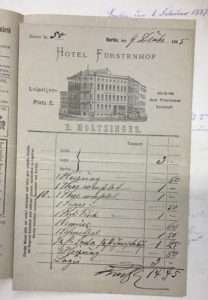The Lives of Parliamentarians 1871–1918
Work, Private Life and Mandate – Social and Cultural Foundations of Parliamentary Representation

Friedrich von Payer (1847-1931) became a newly elected member of the Reichstag in spring 1877. His first weeks of session were ill-fated: in his daily letters to his wife Alwine in Stuttgart, he lamented his homesickness, the bad weather in Berlin, equally expensive and unsatisfying theatre performances and boring Reichstag sessions. The involuntary relocation from his privately rented room to a hotel apartment – ‘costs including service: 3 Marks daily’ – turned the already costly mandate into a ‘money burner’. ‘I’d love to take all my things to the train station right now and go home; we are virtually sick and tired’, von Payer wrote to his wife as early as late April 1877. Despite these remarks and the unfavourable start, he stayed in Berlin and kept his political mandate almost continuously for 41 years.
Most Reichstag deputies have left notes, memos, sometimes diaries and, above all, extensive correspondences about their experiences as parliamentarians.
These letters are not only of great social historical significance, they are also highly political: they shed light on the parliamentarians’ understanding of their roles and on the emerging, and often critically viewed, social profile of the modern ‘career politician’. At the same time, they allow for deep insights into the elected deputies’ everyday life between work, family and political activities.
Project
Based on these sources, which have hitherto been ignored by historians, the new KGParl research focus »The Lives of Parliamentarians 1871–1918« explores the social and cultural foundations of parliamentarian representation. It is funded by the DFG.
The project has started in 2021 and is a joint undertaking between the KGParl and the Historical Commission at the Bavarian Academy of Sciences (Munich). It explores the decades after the foundation of Imperial Germany when the parliamentarian mandate turned from a voluntary activity into a quasi-professional career.
Sources
The extensive correspondence with their closest confidants allows us to trace back the changing lifeworlds of parliamentarians as a result of the ‘professionalization’ of politics. A focus is placed on the analysis of ‘private’ letters of members of the Reichstag and the Prussian House of Representatives. These documents are part of the collections of personal papers, which have long been dismissed as ‘apolitical’ and thus almost entirely ignored. The progressive split of their ‘lifeworlds’ is a constant theme in their communication with family and friends. The correspondence with their wives is most crucial in this respect.
Monograph and edition
A monograph examines the everyday life of parliamentarians and the impact of professionalization on parliamentarianism and politics (edited by Lukas Moll, M.A.). Furthermore, a digital collection of letters (edited by Dr. Matthias Berg) reflects the letters’ diversity of topics, which are analysed in the context of the project.


